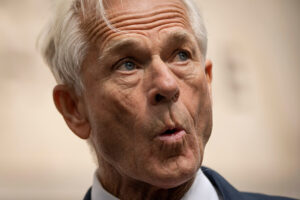Trump Makes Retroactive Privilege Claim For Advisor Peter Navarro. Which Is ... Not How Any Of This Works.
Let's do the Time Warp again.

(Photo by Drew Angerer/Getty Images)
Trump econ loon Peter Navarro never intended to hire a lawyer. The self-proclaimed expert on all things from epidemiology to election law was pretty sure he could be his own best advocate. So when he refused to engage with the January 6 Select Committee citing executive privilege, he did it without the advice of counsel.
For weeks after his arrest for contempt of Congress, Navarro continued to insist he’d go pro se and beat the charges. Eventually he quit spamming the courtroom clerk with ex parte emails and hired competent lawyers, but the pleadings have scarcely gotten less wild, even with Stanley Woodward signing his name on them.

Curbing Client And Talent Loss With Productivity Tech
Indeed, Navarro’s lawyers seem set on repeating the exact same playbook that Steve Bannon used to get himself convicted of the same charge last summer. They’re somewhat hampered in this effort, however, because Navarro, lacking counsel at the time, failed to get even the meager written instruction from Trump to “where appropriate, invoke any immunities and privileges he may have from compelled testimony in response to the subpoena” and “not produce any documents concerning privileged material.” Where other witnesses used those letters as a fig leaf, Navarro showed his whole … peach … to Congress. So his legal team has been reduced to suggesting that Trump made a verbal invocation of privilege, perhaps whispering it in Navarro’s ear, without submitting an affidavit from either the former president or their client that any such thing actually occurred.
Lacking any actual evidence, US District Judge Amit Mehta barred Navarro from presenting executive privilege, Navarro’s subjective belief that Trump had asserted such a privilege, or selective prosecution as defenses. This was entirely consonant with Judge Carl J. Nichols’s rulings in the Bannon case. Nevertheless, like his buddy Steve, with whom he plotted the “Green Bay Sweep” fake electors scheme, Navarro refuses to take no for an answer.
He immediately responded with an exhibit list that included his own contemporaneous emails expressing an intent to evoke privilege and sue the government, as well as statements from Trump invoking privilege as to the unrelated coronavirus congressional investigation. Navarro also demanded that the House disclose all internal communications regarding his referral to the Justice Department, as well as any executive privilege invocation by any other witness.
The government responded that the communications regarding the Covid committee were irrelevant, as was the lawsuit he filed against the FBI after being indicted, and that Navarro’s self-serving statements are hearsay. It further refused to turn over congressional documents because, even if the court hadn’t barred the reliance defense, Navarro can’t possibly claim to have relied on something he’s just now finding out in discovery.
Sponsored

AI Presents Both Opportunities And Risks For Lawyers. Are You Prepared?

Law Firm Business Development Is More Than Relationship Building

Curbing Client And Talent Loss With Productivity Tech

Law Firm Business Development Is More Than Relationship Building
But Navarro had another trick up his sleeve, and this week he presented the first evidence — sort of — that Trump invoked privilege as to the January 6 Committee. It comes in the form of a letter from Trump’s lawyer Evan Corcoran to Navarro expressing Trump’s general tendency to invoke privilege, and “confirm[ing] President Trump’s position that, as one of his senior advisors, you had an obligation to assert executive privilege on his behalf and fully comply with the principles of confidentiality stated above when you responded to the Committee’s subpoena.” The letter is dated January 23, i.e. Tuesday of this week. As in two days ago, or eleven months after he was subpoenaed by Congress.
That’s … not an affidavit. It’s not even confirmation of Navarro’s claim that Trump verbally instructed him to invoke privilege. And it doesn’t explain why Trump didn’t give Navarro a letter the way he did for every other senior advisor. (Hint: They all hired lawyers.)
The Corcoran letter accompanies a motion by the defendant asking the court to reconsider everything it said seven days ago. Perhaps Judge Mehta would like to let Navarro argue that he really did believe that Trump had invoked a blanket privilege? Or let him make a case for selective prosecution because other advisors who hired lawyers to engage with the committee, instead of sending nasty emails telling them to pound sand, didn’t wind up indicted?
After all, he argues, “Despite being advised by President Biden’s White House Counsel that, ‘an assertion of executive privilege would not in their view be appropriate,’ Mr. Cipollone’s counsel advised the Select Committee that, ‘Mr. Cipollone will not speak about Presidential — direct Presidential communications as those are privileged.’”
Which may not be the massive own of the DOJ that the defendant thinks it is. After all, Cipollone’s lawyers made sure he had written confirmation that Trump wanted him to invoke privilege. And he showed up and testified at length on everything that wasn’t a direct presidential communication. In contrast, Navarro gave the committee the finger and refused to even talk about his communications with podcaster Steve Bannon, despite having written about them extensively in his own book.
Sponsored


Generative AI at Work: Boosting e-Discovery Efficiency for Corporate Legal Teams
Perhaps Navarro and Bannon can get together and come up with a catchy name for whatever this strategy is. Maybe the “Potomac Flop?” Or perhaps the “Green Bay Weep?”
Well, they’ll probably have a few months of quiet time to workshop it …
US v. Navarro [Docket via Court Listener]
Liz Dye lives in Baltimore where she writes about law and politics.







